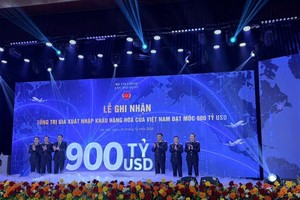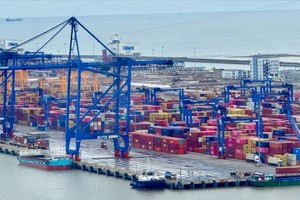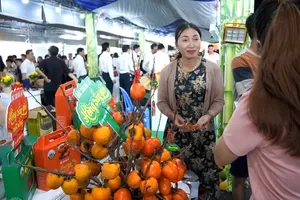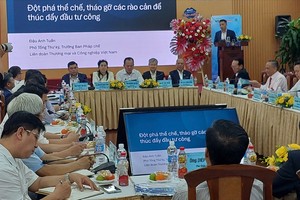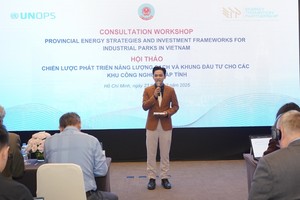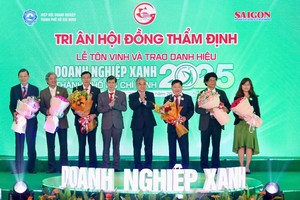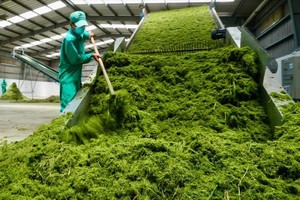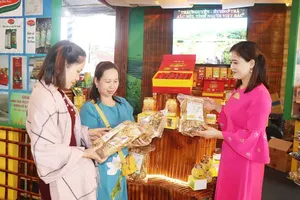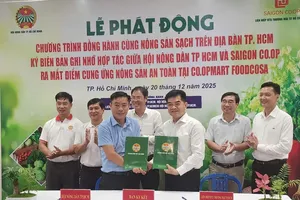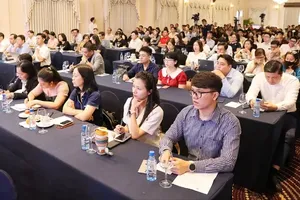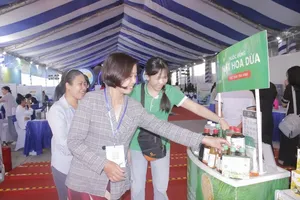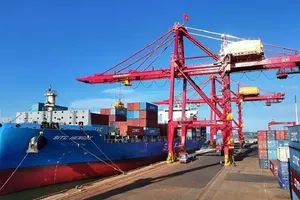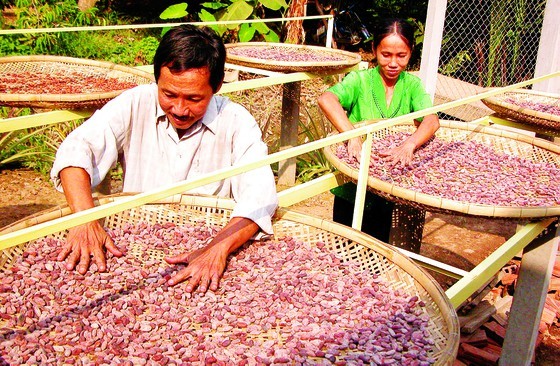
According to Mr. Bui Huy Son, Ambassador Counselor, Head of the Vietnam Trade Office in the US, after many years of establishing trade, up to now, there are only six types of Vietnamese fruits, including mango, dragon fruit, rambutan, lychee, longan, and custard apple, eligible for export to the US with extremely modest volume. Authorities continue to pave the way to bring more agricultural products to this market. Meanwhile, the capability of enterprises to meet the standards and quality required by the market remains poor, and it is also hard for Vietnamese goods to compete on price because of high transportation costs.
For instance, to be imported into the US market, Vietnamese mangoes have to pass many strict standards of food safety and regulations from partners, such as conditions of orchards, packaging, treatment, irradiation, and phytosanitary. Specifically, orchards and processing and packaging facilities must have code numbers issued by the Department of Plant Protection and the Animal and Plant Health Inspection Service (APHIS) for management and traceability. All batches of goods before exporting must be treated with a minimum dose of 40Gy, checked, and granted phytosanitary certificates by the Department of Plant Protection and APHIS.
Similarly, with dragon fruit, Mr. Peter Hong, Permanent Vice Chairman of the Business Association of Overseas Vietnamese, said that although Vietnam has a dragon fruit production of up to 2.7 million tons per year, only about 5 percent of dragon fruit production is exported to the US. Meanwhile, 62 percent is sold to China, and the rest is for domestic consumption. One of the main reasons that make it difficult for this kind of fruit to access the US market is that the quality of the fruit is unstable, and it has not ensured the safety standards set by the US. Moreover, the price is also very high. Currently, a kilogram of dragon fruits in the US is around US$2.4, while Vietnamese dragon fruits are sold at up to $7 per kilogram, so it is hard to compete with the same products in this market.
Mr. Pham Thien Nghia, Vice Chairman of the People's Committee of Dong Thap Province, informed that in recent years, agricultural production and aquaculture in the Mekong Delta have no longer confined to domestic consumption and selling raw materials. They are aiming to link the production of high-value products and establish a value chain of goods for export to fastidious markets, including the US market. Dong Thap has been focusing on developing safe agriculture with ensured quality and stable supply all year round. Products such as pangasius fillets, fish skin collagen, rice products, and fruits have been exported to many different countries. However, just a few local enterprises have cooperated with US partners, including overseas Vietnamese enterprises. Dong Thap's export turnover reaches $1.3 billion each year, of which exports to the US merely exceed $200 million. Connecting with overseas Vietnamese enterprises is a good opportunity to link and develop distribution channels of local products to potential markets like the US.
According to Ambassador Extraordinary and Plenipotentiary of Vietnam to the US Ha Kim Ngoc, the Vietnamese community in the US is quite large, with more than 2 million people, accounting for nearly 50 percent of overseas Vietnamese. They own more than 300,000 business establishments all over the states and will be the force to support domestic enterprises to bring goods into the US market. He said that the connection between provinces in the Mekong Delta and Vietnamese overseas enterprises in the US would contribute to promoting the strengths of each locality and enterprise. With the transport and logistics systems being constantly invested and developed, provinces in the Mekong Delta are becoming one of the major export hubs of the country.
According to Mr. David Duong, Chairman of the Vietnamese American Business Association, currently, some people are importing Vietnamese goods and distributing them in the US market but on a small scale. Besides, some types of fruits from Vietnam are also available in US supermarkets. This is a good sign, but if we let the small importers and exporters do it unilaterally, it will be hard to control the quality of goods when exporting on a large scale.
The US enterprises may import Vietnamese goods today, and tomorrow they import goods from another country if Vietnamese products fail to maintain stable quality. Therefore, if Vietnamese enterprises have a place to gather goods for inspection and quality control, they will ensure their prestige, and Vietnamese goods will be exported sustainably to the US market, said Mr. David Duong.
Mr. Nguyen Trac Toan, Consul General of Vietnam in San Francisco, recommended that in the current context, online advertising is quite popular, but this is not the strength of Vietnamese enterprises. Domestic enterprises also need to carefully check contracts and actively coordinate with Vietnamese representative agencies in the US to get information about partners. Enterprises need to determine that they must do business in a sustainable and long-term way. Besides, it is essential to comply with the laws of the two sides, contribute to promoting the bilateral relationship, and contribute to the homeland. At the same time, they must study to have more ways and activities to strengthen connections and implement more practical activities. They should also enhance close contact with Vietnamese representative agencies in the US to be fully and promptly provided with information about the market, policies changing.
Many people also said that it is high time for domestic enterprises to make extensive changes from the method of production and trading, selecting crop varieties, and applying technology to choosing a high-yield, environmentally friendly processing process. The country needs to consult and learn more from countries with strengths in agricultural production and export to produce high-quality products, meeting food safety standards. Only in that way can Vietnamese enterprises satisfy orders from partners, creating high added-value for Vietnamese agricultural products.
For instance, to be imported into the US market, Vietnamese mangoes have to pass many strict standards of food safety and regulations from partners, such as conditions of orchards, packaging, treatment, irradiation, and phytosanitary. Specifically, orchards and processing and packaging facilities must have code numbers issued by the Department of Plant Protection and the Animal and Plant Health Inspection Service (APHIS) for management and traceability. All batches of goods before exporting must be treated with a minimum dose of 40Gy, checked, and granted phytosanitary certificates by the Department of Plant Protection and APHIS.
Similarly, with dragon fruit, Mr. Peter Hong, Permanent Vice Chairman of the Business Association of Overseas Vietnamese, said that although Vietnam has a dragon fruit production of up to 2.7 million tons per year, only about 5 percent of dragon fruit production is exported to the US. Meanwhile, 62 percent is sold to China, and the rest is for domestic consumption. One of the main reasons that make it difficult for this kind of fruit to access the US market is that the quality of the fruit is unstable, and it has not ensured the safety standards set by the US. Moreover, the price is also very high. Currently, a kilogram of dragon fruits in the US is around US$2.4, while Vietnamese dragon fruits are sold at up to $7 per kilogram, so it is hard to compete with the same products in this market.
Mr. Pham Thien Nghia, Vice Chairman of the People's Committee of Dong Thap Province, informed that in recent years, agricultural production and aquaculture in the Mekong Delta have no longer confined to domestic consumption and selling raw materials. They are aiming to link the production of high-value products and establish a value chain of goods for export to fastidious markets, including the US market. Dong Thap has been focusing on developing safe agriculture with ensured quality and stable supply all year round. Products such as pangasius fillets, fish skin collagen, rice products, and fruits have been exported to many different countries. However, just a few local enterprises have cooperated with US partners, including overseas Vietnamese enterprises. Dong Thap's export turnover reaches $1.3 billion each year, of which exports to the US merely exceed $200 million. Connecting with overseas Vietnamese enterprises is a good opportunity to link and develop distribution channels of local products to potential markets like the US.
According to Ambassador Extraordinary and Plenipotentiary of Vietnam to the US Ha Kim Ngoc, the Vietnamese community in the US is quite large, with more than 2 million people, accounting for nearly 50 percent of overseas Vietnamese. They own more than 300,000 business establishments all over the states and will be the force to support domestic enterprises to bring goods into the US market. He said that the connection between provinces in the Mekong Delta and Vietnamese overseas enterprises in the US would contribute to promoting the strengths of each locality and enterprise. With the transport and logistics systems being constantly invested and developed, provinces in the Mekong Delta are becoming one of the major export hubs of the country.
According to Mr. David Duong, Chairman of the Vietnamese American Business Association, currently, some people are importing Vietnamese goods and distributing them in the US market but on a small scale. Besides, some types of fruits from Vietnam are also available in US supermarkets. This is a good sign, but if we let the small importers and exporters do it unilaterally, it will be hard to control the quality of goods when exporting on a large scale.
The US enterprises may import Vietnamese goods today, and tomorrow they import goods from another country if Vietnamese products fail to maintain stable quality. Therefore, if Vietnamese enterprises have a place to gather goods for inspection and quality control, they will ensure their prestige, and Vietnamese goods will be exported sustainably to the US market, said Mr. David Duong.
Mr. Nguyen Trac Toan, Consul General of Vietnam in San Francisco, recommended that in the current context, online advertising is quite popular, but this is not the strength of Vietnamese enterprises. Domestic enterprises also need to carefully check contracts and actively coordinate with Vietnamese representative agencies in the US to get information about partners. Enterprises need to determine that they must do business in a sustainable and long-term way. Besides, it is essential to comply with the laws of the two sides, contribute to promoting the bilateral relationship, and contribute to the homeland. At the same time, they must study to have more ways and activities to strengthen connections and implement more practical activities. They should also enhance close contact with Vietnamese representative agencies in the US to be fully and promptly provided with information about the market, policies changing.
Many people also said that it is high time for domestic enterprises to make extensive changes from the method of production and trading, selecting crop varieties, and applying technology to choosing a high-yield, environmentally friendly processing process. The country needs to consult and learn more from countries with strengths in agricultural production and export to produce high-quality products, meeting food safety standards. Only in that way can Vietnamese enterprises satisfy orders from partners, creating high added-value for Vietnamese agricultural products.
